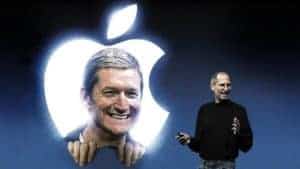Steve Jobs and Tim Cook: The Pair that Makes Apple Successful
Belsky is busy recently promoting his latest book, Making Ideas Happen. Quoting Wired Magazine, July 26, 2011, “In the book he argues that ideas for new businesses or solutions to problems are common, but great execution is rare. He emphasises the need for organisation and strategic thinking, offering practical advice about how to convert ideas into actions.”
Belsky explained to Wired Magazine: “My team and I feel that the creative community is one of the most disorganised communities on the planet, but it’s also where the greatest ideas come from. And it’s a shame that most of them never happen. The book is about the creative individuals and teams that somehow defy the odds again and again and make their ideas happen. It entirely debunks the myth that ideas happen because they’re great or by accident and demonstrates that there are other forces at play, mainly organisation and execution.”
Belsky believes that organisation is the competitive advantage in the creative world. He explains: “Very productive creative individuals and teams — even bands — have at some point made a compromise, saying ‘at this point we need to overcome our natural tendencies to come up with more ideas, not impose structure, not have deadlines or budget. Those who figure out how to be organised get ahead.”
Apple is a great example of a creative company that has discovered how to be organised. Belsky says: “Apple is a company that’s known for having great ideas and being really creative, but it’s also one of the most organised companies in the world. Each year, AMR Research publishes its ranking of the 25 most organised companies in the world in Supply Chain Management magazine. For the last three years, Apple has been at the top.”
 That’s amazing. We admire Apple for its creative genius. Now we must admire Apple for it’s organisational genius. This starts with Steve Jobs foresight to partner with an execution genius like Tim Cook.
That’s amazing. We admire Apple for its creative genius. Now we must admire Apple for it’s organisational genius. This starts with Steve Jobs foresight to partner with an execution genius like Tim Cook.
Belsky elaborates: “Were they the first ones to come up with an MP3 player? No. Were they the first ones to come up with a tablet? No. But they were well-equipped to execute them. This brings me to the controversial conclusion that maybe Tim Cook is as important if not more important than the other guy [Steve Jobs].
“I don’t think people realise that because we always like to have the creative dream that it’s the visionary who has this idea and it somehow, someway happens.”
Key takeaway: Creative genius requires organisation to succeed in a big way. Steve Jobs (creative) and Tim Cook (organisation) are the best examples of what level of results can be produced when these two geniuses complement each other.
Feel free to contact me with questions on this topic at robk@intelliversity.info
